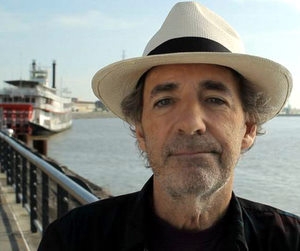With an opening night-screening of his levee-failure documentary, “The Big Uneasy,” at the Prytania Theatre in Uptown New Orleans, Harry Shearer knew he would be preaching to choir.
Taking the theatre stage to a full house’s standing ovation after Monday’s late showing, Shearer thanked the audience for their enthusiasm but described his broader goal.
“Nothing is more moving to me than hearing the reaction of the people of New Orleans, the city I adopted, the city that adopted me,” Shearer said. “But it wasn’t made for us. It was made for the rest of the country.”
In his 94-minute film, the entertainer suppresses his own comedic persona to instead act as impresario for the tragic ironies that dominate the story of failed flood protection in New Orleans. The U.S. Army Corps of Engineers is both the villain of the story and often (inadvertently) the comic relief, but Shearer made clear that he recognizes New Orleanians already know them that way. It’s the rest of the country’s view he is seeking to change.
He was inspired to make the film after hearing President Obama last year describing the devastation in the city as a result of Hurricane Katrina, as a natural disaster rather than an engineering failure, “the same crap” that the President said Sunday on the fifth anniversary, he told the crowd. And while members of the audience were urging him to turn his attention next to the oil in the Gulf of Mexico, Shearer said he is waiting to see if the country is open to a new understanding of 2005’s flooding.
“A big part of me never wants to do this again as long as I live,” Shearer said. “I would love to judge the project based on how y’all feel about it and how I feel. But, I have to judge it on how effective I am at achieving my goal: giving the city a chance to reclaim control over this narrative.”
Shearer described some frustration with the process so far. He had hoped to premiere “The Big Uneasy” with a major event in the city, but those planning the event wanted it to be about BP, the topic du jour, so Shearer cancelled that approach. He also retold the story about his attempt to buy airtime on NPR, only to have his description of his film as a “documentary about why New Orleans flooded” rejected; only a documentary about “New Orleans and Hurricane Katrina” would be allowed, he said.
The same bad habits crept back into even the better news outlets’ reporting on the flood’s fifth anniversary, he noted.
“If I had money left over, I would set up an electroshock camp for journalists,” Shearer said. “Every time they say ‘wrath of Katrina’ — Zzzt!”

Berkeley professor Bob Bea / thebiguneasy.com
In the audience at the Prytania, however, Shearer had a small army of volunteers eager to help him reopen the national dialogue. How can we help Berkeley engineering professor Bob Bea, they asked, after he was so mistreated by his peers for his research critical of the Corps? (Send him a grateful email, Shearer responded.) Perhaps Bill Maher could help with distribution, another audience member suggested. (“We’re approaching everybody,” he answered.) When can we get the DVD? Won’t you run for Congress?
“Documentaries usually have a call to action at the end,” Shearer said. “I wish I had something like that to tell you. I wish I knew the simple thing to do.”
In fact, Shearer did offer two solutions, one in the film, and one afteward. Though the original cut of “The Big Uneasy” ran three hours, he could not bear in the editing room to leave out the description of the Dutch’s holistic approach to water management, their “idea of living with water instead of being at war with water,” and its applications for New Orleans.
And while the Corps will still be a major obstacle, he noted afterward, he suggested that New Orleanians may be developing the strength to overcome them.
“One of the things that New Orleans is great at in the post-Katrina period is organizing communities, organizing neighborhood groups,” Shearer said, encouraging the audience to spread the word and noting that the Prytania has extended the film’s run.
After the film, after the questions, Stephen Nelson stood outside the theater at nearly midnight, reflecting on Shearer’s work. As the chair of Tulane University’s Earth and Environmental Sciences department, Nelson said he takes students on field trips to the levee-breach sites to make some of the same points about what he calls “the myths of Katrina.”
But even if the film finds a wide enough audience, five years later is a difficult point to begin changing people’s minds, Nelson acknowledged.
“It’s really tough. The momentum is not there anymore, especially now with the fifth anniversary,” Nelson said, then paused and reconsidered slightly. Maybe now is the right time, if efforts like Shearer’s become more mainstream, he said: “Maybe slowly.”
Contact Robert Morris at rmorris@NolaMessenger.com, or leave a comment below.
